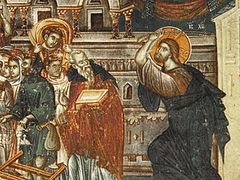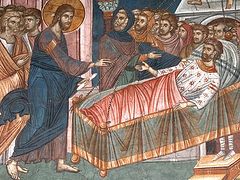Forgiveness Sunday has come and gone, but the need to continue forgiving our offenders remains. How can we do this when we are greatly offended, when we mentally understand the need for forgiveness but our heart resists it in every way possible?
Our offenses are from selfishness and pride
I notice that sometimes a person takes offense at himself and he can’t forgive himself this or that blunder. Or he remembers how he offended a family member, shortchanging him in love. It’s a widespread phenomenon, especially after the death of a loved one.
Sometimes people are offended by those who are no longer on earth and they can’t forgive the long-dead. Most often we hold grudges against our parents, especially our mothers. I remember how one woman said she couldn’t forgive her husband who died early. “He died and I’m alone. How could he leave me alone?!” The tragedy of loneliness.
 Fr. Alexander Dyachenko And, of course, we’re also offended by those who are still alive. We get offended, and we don’t remember that our inner negativity from all these offenses doesn’t destroy the person we’re holding a grudge against, but firstly ourselves. What’s the use of being offended by someone who has long been rotting in the grave? Or I have harbored evil against someone and he doesn’t even know it. He lives in another city and has forgotten about me, but I still can’t calm down. This is where diseases come from—from depression, to cardio-vascular sicknesses, to cancer.
Fr. Alexander Dyachenko And, of course, we’re also offended by those who are still alive. We get offended, and we don’t remember that our inner negativity from all these offenses doesn’t destroy the person we’re holding a grudge against, but firstly ourselves. What’s the use of being offended by someone who has long been rotting in the grave? Or I have harbored evil against someone and he doesn’t even know it. He lives in another city and has forgotten about me, but I still can’t calm down. This is where diseases come from—from depression, to cardio-vascular sicknesses, to cancer.
Our offenses are from selfishness and pride. What can we do to help ourselves? Ask for the Lord’s help and pray for those we’re holding a grudge against. If you’re angry at the reposed, pray for his repose, put his name on your commemoration list at church, and light a candle for him. It’s the same for the living. Start praying for their health and well-being. After that, all resentments will melt away, like last year’s snow. Do you doubt it? Test it for yourself.
We begin to forgive only once we have matured spiritually
Forgiveness is not easily given. Sometimes it takes years to forgive someone. And it’s hard to choose the right words for those who cannot forgive.
My mother lost her first daughter, Galya, when she was only a year and two months old. They were in the village when she fell ill with angina. The doctor couldn’t figure out the situation and gave her an injection, after which large spots appeared on her body. They went again and, not paying any attention to the allergic reaction, the doctor confidently gave her another shot. The child stopped breathing. The doctor had no medicines that could have prevented the reaction from the shot. Artificial respiration didn’t help. The child died.
It’s useless to describe how much the family had to endure then. For obvious reasons, the doctor tried to deny responsibility, then she and her husband left the village, but if you understand the situation, of course she was inwardly tormented. She was as good as dead to my family. My mother turned to God many years later, was baptized, and began to confess and commune. But there remained a languid feeling about the experience for a long time. Then one day my mother specifically got ready and went to church. Passing under the arches of the church, she stood before the icons as before the all-seeing eye of God, and quietly pronounced words of forgiveness for this person that she hadn’t been able to forgive for a long time. She felt relief in her heart and my mother left the church a new person.
We begin to forgive only once we have matured spiritually, when we look at the past in a new way. Yes, we were treated unfairly, meanly, nastily in certain situations, but the Lord is always with us. He leads us by the hand through these thorns, so the soul would become wiser, so we wouldn’t feed upon the illusions of this perverse world but would create something genuine that no one could ever take away.
Every difficult situation is allowed for us by the Lord God. They are given for us to learn a lesson. Many difficult lessons are given. But the Lord leads us by the hand through life; He is near, and He leads us through these unpleasant situations, saving our souls and purifying them through sorrows.
 Fr. Valery Dukhanin Here’s what we should always remember: Resentment destroys us from the inside. Unforgiveness is our torment, the same as putting red-hot coals on your throat. That’s how someone who can’t forgive suffers. But we don’t forgive due to our weakness. We begin to forgive when the soul becomes spiritually stronger.
Fr. Valery Dukhanin Here’s what we should always remember: Resentment destroys us from the inside. Unforgiveness is our torment, the same as putting red-hot coals on your throat. That’s how someone who can’t forgive suffers. But we don’t forgive due to our weakness. We begin to forgive when the soul becomes spiritually stronger.
We also begin to forgive when we stop looking at everyone from the position of our vulnerability: “They didn’t help me,” “they promised me but didn’t fulfill it,” “I was deceived, betrayed.” This is the position of an egotist, who, like any king, wants to judge and extract from his subjects. But we are not kings, we are egoists, and we don’t forgive because we look at everyone only from the position of our own benefit.
We also begin to forgive when we suddenly see the light that all around us are people who are weak just like we are. They make the same mistakes that we do. But for some reason we painfully penalize them and don’t see our own sins. It’s terrible. Only when our eyes are opened to our own terrible infirmities, when we suddenly see that our own soul swarms with villainy, betrayal, deception, that we are tempted and sin incredibly quickly, do we understand why someone else stumbled—because he is just as infirm as we are and makes the same mistakes that we do.
To not forget means to cower from indignation; that is, to be defeated and tormented. Forgiveness is the victory in your heart of love over hatred, mercy over rancor. It is freedom because he who is not bound by any shackles of evil desires is free. Forgiveness brings joy. He who has forgiven is freed from his burden, for his own sins are forgiven, according to the words of Christ: Forgive, and ye shall be forgiven (Lk. 6:37).
Between sins of weakness and willful sins is a great abyss
 Fr. Dmitry Vydumkin In this case, the most important thing is that our “I want to forgive” is real, for the Lord, as we know, kisses our intentions.
Fr. Dmitry Vydumkin In this case, the most important thing is that our “I want to forgive” is real, for the Lord, as we know, kisses our intentions.
The thing is that the law that the Holy Fathers talk about when they talk about sin through weakness and willful sin is active here. Between these is a great abyss. If a sin is willful, it undoubtedly leads to destruction, but a sin committed out of weakness, which a man is aware of and meets in battle, has a completely different meaning. The meaning of such sin is in the gradual humbling of man and in the strengthening of his will for good. When someone realizes his infirmity and strives to fight it, then if he sometimes happens to fall, it serves for his salvation, if, of course, he doesn’t weaken in the struggle and in repentance. And the help of God will always accompany him on this path.
These arguments are also valid in regard to the sin of rancor. There’s nothing terrible about the human heart not being able to let go of a grudge quickly due to weakness. It’s not only with this kind of sin that we have to fight, sometimes for years and even decades. The most important thing is that we have a sincere desire to forgive and battle with any manifestation of rancor in the heart, and constant prayer to the Lord for help in overcoming sin. If these three main points in relation to this, or any other sin, are present in a man, it means he is on the right path, and when God pleases, he will certainly prevail.
Thinking about our offenses is when the demons rile us up
 Fr. Sergei Begiyan Sometimes, in order to forgive, we have to do a lot of work on ourselves, practically a podvig. In order clear resentment from our heart, we must pray for our offender, and not just by “commemorating” him in our morning prayers. Sometimes it happens that our thoughts of resentment don’t allow us to sleep or eat, with a verbal altercation with our offender constantly playing in our mind—that’s the demons riling us up, not allowing anger and irritation to subside. In this case, only prayer, the unceasing Jesus Prayer for someone, helps us come to ourselves: “Lord, Jesus Christ, Son of God, have mercy on your servant X!” This is the only way I have managed to escape from a mental storm many times. You also need to beg for yourself the ability to forgive the person who has sinned against you. You pray, you remember your own sins, and then slowly comes not just a mental awareness, but a heartfelt acceptance that every offense and temptation is a punishment and admonition for our own sins. Then the heart softens and opens and rancor disappears.
Fr. Sergei Begiyan Sometimes, in order to forgive, we have to do a lot of work on ourselves, practically a podvig. In order clear resentment from our heart, we must pray for our offender, and not just by “commemorating” him in our morning prayers. Sometimes it happens that our thoughts of resentment don’t allow us to sleep or eat, with a verbal altercation with our offender constantly playing in our mind—that’s the demons riling us up, not allowing anger and irritation to subside. In this case, only prayer, the unceasing Jesus Prayer for someone, helps us come to ourselves: “Lord, Jesus Christ, Son of God, have mercy on your servant X!” This is the only way I have managed to escape from a mental storm many times. You also need to beg for yourself the ability to forgive the person who has sinned against you. You pray, you remember your own sins, and then slowly comes not just a mental awareness, but a heartfelt acceptance that every offense and temptation is a punishment and admonition for our own sins. Then the heart softens and opens and rancor disappears.





An example: Child A says: "You are a poo poo head." Normally a child would run to their teacher...
Child B now says: "You hurt my feelings because you called me poo poo head. My name is Chloe. Child B says: I am sorry will call you Chloe. Will you forgive me?" Child B usually says yes and they go on playing.
If I, as the teacher see this transpire I will use this as a teaching moment.
Teaching these precious students at a young age will help them become better people.